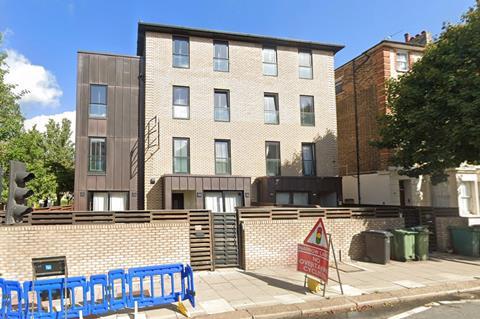Building safety minister hears from worried leaseholders about alleged defects including movement and cracking
Camden Council is exploring options to get alleged defects at a private block of flats fixed after the building safety minister raised concerns the building could “become dangerous”.
Built less than a decade ago, 53 Agar Grove was developed by Prime Metro, built by contractor Cite Construction and signed off by Salus Approved Inspectors.

Earlier this month, building safety minister Lee Rowley wrote to council leader Georgia Gould expressing concern about problems at the four-storey block.
He said leaseholders had complained to him of “structural movement causing cracks in the exterior walls and sealing windows shut” and encouraged the council to look into whether the building had become dangerous.
Rowley asked Camden’s building control team to “consider whether there is sufficient evidence” to prosecute Salus, which carried out building control work on the scheme.
In response, a Camden council spokesperson, said: “Following changes made by central government, private building inspectors can sign off on new developments without approval from Local Authority building control.”
Building control was privatised in 1985 and local authorities have no authority over approved inspectors.
“This unfortunately creates situations like this as we have no powers over the decisions made by private inspectors,” the council added.
“We want to do all we can to support the leaseholders at 53 Agar Grove and we are urgently exploring what enforcement options are available to us.”
Salus director Stuart Power said he understood the “considerable frustration” of leaseholders but that “despite several requests” his firm had not been given access to professional reports on the current state of the building.
“We remain confident of the role we took in assuring the build met all appropriate regulations at the time of construction, but this would not preclude future build problems from occurring which, in the ordinary course of events, new-build housing warranties should cover,” he said.
“In order to assist the owners in their plight, we are willing to review the reports and comment on the aspects relating to Building Regulation compliance.
“The new-build warranty insurers, developers and sub-contractors should work together to identify the cause of any defect and we will assist with this process where we can.”
According to developer Prime Metro, it employed Cite Construction under a design and build contract, eventually selling four of the seven flats “in good faith” and retaining three as “long-term investments”.
“We had no idea that the building had the structural issues that it has now begun to display and relied upon Salus, the building control inspectors, sign off prior to marketing,” it said in a statement.
“Since the problems began to appear in the building Prime Metro has undertaken independent structural investigations, ongoing monitoring and have engaged a structural engineer & legal team to represent the freehold & leasehold interests.
“Prime Metro will continue to fight to ensure that the necessary remedial work is undertaken at no cost to the leaseholders.”
The developer added that Acasta, the structural warranty insurers, had recently proposed a scheme of works which would allow the building to be fit for purpose restore the former value of the flats.
The insurer told The Mirror last week: “Acasta is fully engaged with and is discussing concerns raised regarding the property with all interested parties.
“We take these concerns very seriously and are committed to fulfilling any obligations under the relevant insurance policies.”
Cite Construction has been contacted for comment.




























No comments yet